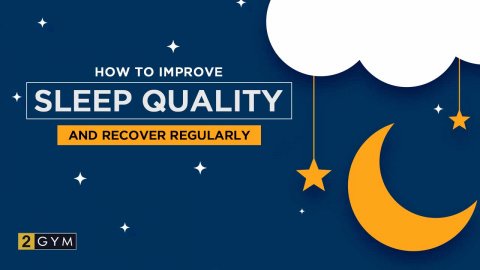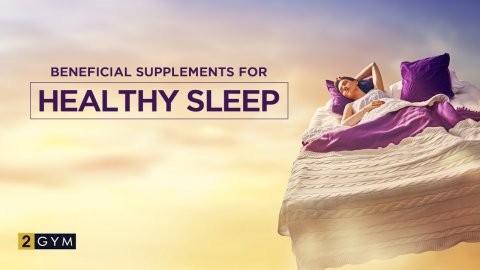How to Improve Sleep Quality and Get Regular Rest
Fortunately, there are numerous ways to improve sleep quality.
Below are 29 tips to help you fall asleep. Go through this list, assess your weaknesses, and start addressing the most obvious issues.
You may need to experiment a bit to find the combination that works best for you, but it's worth it.
1. Sleep in Complete Darkness
Even the slightest light can disrupt the production of melatonin and serotonin in the pineal gland, which in turn can disrupt your sleep cycle. Even dim light from a clock radio can negatively impact sleep.
To create the darkest environment in your bedroom, it's recommended to close the door, eliminate any sources of nighttime light, and use blackout curtains or a well-fitting eye mask.
Also, avoid turning on lights at night, even if you need to go to the bathroom. In case of urgent need for nighttime lighting, it's recommended to use a red light bulb as it has the least impact on the sleep process.
2. Room Temperature
Research shows that the optimal temperature for sleep ranges from 60 to 68 degrees Fahrenheit (15.6 - 20 degrees Celsius).
Maintaining a temperature higher or lower than this range in the bedroom can lead to restless sleep. When you sleep, your body's internal temperature drops to its lowest level, usually about four hours after falling asleep.
Scientists believe that a cooler bedroom temperature may be most conducive to sleep as it mimics the natural decrease in your body temperature.
3. Sleep Naked
Sleeping naked can help improve sleep quality, partially due to preventing overheating.
One study showed that even a slight difference in skin surface temperature, such as 0.08 degrees Fahrenheit (or 0.4 degrees Celsius), contributes to a more restful sleep.
Additionally, research has shown that sleeping naked has several other health benefits, including improving metabolism and circulation.
4. Acoustic Pollution
Addressing acoustic pollution plays an important role in ensuring healthy and quality sleep. The impact of noise on sleep can be significant, as even small sounds can interfere with falling asleep and lead to nighttime awakenings.
There are several ways to combat acoustic pollution in the bedroom.
Firstly, using earplugs can significantly reduce the level of external noise and create a calmer atmosphere for sleep.
Earplugs are available in various options and price ranges, allowing you to choose the suitable option for your individual needs.
In addition, you can take extra measures to mitigate noise in the bedroom, such as installing soundproofing materials on the walls or using sound-absorbing items, such as rugs or heavy curtains.
These methods can further help reduce the intrusion of external sounds and create a quieter sleep environment.
5. Electrical and Electromagnetic Fields in Your Bedroom
Eliminating electrical and electromagnetic fields (EMFs) in your bedroom plays an important role in maintaining healthy sleep and overall well-being.
-
Influence on Melatonin and Serotonin Production EMFs can disrupt the normal functioning of the pineal gland, which is responsible for producing melatonin and serotonin, hormones that play a crucial role in regulating sleep and mood. Increased levels of EMFs in the environment can lead to reduced production of these hormones and disruption of the sleep-wake cycle.
-
Damage and Dysfunction of Mitochondria Mitochondria are organelles inside cells responsible for energy production. EMFs can cause damage and dysfunction of mitochondria due to excessive oxidative stress, which can be a risk factor for the development of chronic diseases and premature aging.
-
Changes in Neurons and Memory Some studies suggest that exposure to EMFs can cause changes in neurons that affect memory and learning ability. This can have a negative impact on cognitive functions and mental health.
-
Measures for Mitigation To reduce the impact of EMFs in the bedroom, it is recommended to turn off electricity before sleep by switching off the circuit breaker. Additionally, you can consider installing a Faraday cage around the bed to create a barrier against electromagnetic fields. This is especially important if your bedroom is located near electrical appliances or close to where power lines pass.
Considering the significance of sleep for overall health and well-being, eliminating EMFs in the bedroom can be an important step towards improving the quality of your sleep and overall condition.
6. Turn Off Wi-Fi Router at Night
Turning off Wi-Fi at night is an important step in ensuring healthy sleep and minimizing the impact of electromagnetic fields (EMFs) on the body. Below are several additional aspects to consider.
-
Potential Risks of Wi-Fi Electromagnetic fields generated by Wi-Fi routers and other wireless devices can have a negative impact on health. Some studies suggest that prolonged exposure to Wi-Fi may be associated with increased risk of certain diseases, such as cancer and neurodegenerative disorders.
-
Avoiding Excessive Exposure During sleep, the body is in a state of repair and regeneration, and excessive exposure to EMFs can interfere with these processes. Turning off Wi-Fi at night helps minimize such unnecessary impacts on the body.
-
Simple Protection Methods: Turning off the Wi-Fi router before sleep is a simple and effective way to protect yourself from excessive electromagnetic radiation. This step is easy to incorporate into your daily routine and does not require significant effort or financial investment.
-
Alternative Connection Methods For those who want to minimize Wi-Fi usage, there are alternative connection methods such as using wired connections. This can be especially useful for stationary devices such as computers and televisions.
-
Measuring Radiation Levels For those concerned about Wi-Fi exposure, it's useful to measure radiation levels using specialized devices. This allows you to assess the level of exposure and take appropriate measures to protect yourself and your family.
Overall, turning off Wi-Fi at night is a simple and effective way to create a healthy and safe environment for sleep and relaxation.
7. Remove Alarm Clocks and Other Electrical Devices
Keep alarm clocks and other electrical devices as far away from the bed as possible, preferably at a distance of at least 1 meter.
Keep your mobile phone as far away from the bedroom as possible if it needs to be on. If you leave it in the bedroom, either turn it off or switch it to airplane mode.
8. Loud Alarm Clocks
Avoid using loud alarm clocks. Sudden awakening from a jolt causes significant stress to your body. If you consistently get enough sleep, an alarm clock may even be unnecessary.
Alternatives include a sunrise alarm clock, which wakes you up by gradually increasing the intensity of light, thereby simulating a sunrise, or a talking alarm clock designed for visually impaired individuals.
I use talking clocks because they allow me to sleep in complete darkness. If I need to know the time, I just press a big button, and the clock tells me the time aloud.
9. 5-Hydroxytryptophan (5-HTP)
One of my favorite sleep aids is 5-HTP. 5-HTP is a hydroxylated form of tryptophan that easily crosses the blood-brain barrier, converting into serotonin, thereby enhancing mood and improving sleep, and then into melatonin.
I believe this is a better approach than using melatonin directly. In a study published in the American Journal of Therapeutics 2010, a supplement containing amino acids, including GABA (a calming neurotransmitter) and 5-HTP, reduced sleep onset time, increased sleep duration, and improved sleep quality.
10. Magnesium Malate or Glycinate Before Bed
Take magnesium malate or glycinate before bed to relax. This can be helpful for stress relief and relaxation before sleep.
Magnesium plays a crucial role in regulating the central nervous system and the level of gamma-aminobutyric acid (GABA), a neurotransmitter that promotes relaxation and sleep. Magnesium deficiency can lead to insomnia and more superficial sleep.
Magnesium malate and glycinate are bioavailable forms of magnesium that are well absorbed by the body. Magnesium malate can also help alleviate muscle tension and reduce pain, further promoting relaxation.
11. Maintain Consistent Sleep Times
Go to bed and wake up at the same time every day, even on weekends. This helps your body establish a sleep rhythm, making it easier for you to fall asleep and wake up in the morning.
Adhering to a regular sleep schedule is a key factor in maintaining healthy sleep and overall well-being. Here's why it's important and how it works:
-
Circadian Rhythm Our bodies have built-in biological clocks that regulate our circadian rhythm - a cyclic process that includes phases of activity and rest. Maintaining a consistent sleep schedule helps synchronize this circadian rhythm.
-
Sleep Stability Regular bedtime and wake-up times help stabilize our sleep and provide deeper and more restful rest. When we go to bed and wake up at the same time every day, our bodies learn to adapt to this rhythm.
-
Improving Sleep Quality Consistency in sleep schedules promotes a regular sleep-wake cycle, making our sleep more efficient and restorative. When we follow a consistent schedule, we more often enter into deep sleep, which is crucial for physical and psychological rejuvenation.
-
Daytime Alertness A proper sleep schedule helps us wake up refreshed and alert every morning. This allows us to be more productive and effective throughout the day, as we do not suffer from drowsiness or fatigue.
-
Adaptation to Changes While a consistent sleep schedule is important, sometimes we need to change our schedule due to various circumstances. However, by striving to adhere to a consistent sleep rhythm as often as possible, we simplify the process of adapting to changes and minimize the negative impact on our sleep and wakefulness.
12. Take a Hot Bath or Shower Before Bed
When your body temperature rises late in the evening, it falls before sleep, facilitating sleep. The drop in temperature after leaving the bath signals to the body that it's time to sleep.
It will also be beneficial if you finish your shower with a cold rinse.
13. Wear Socks Before Bed
Feet often feel colder than the rest of the body because they have the poorest circulation. At least one study has shown that wearing socks before bed reduces the number of nighttime awakenings.
Alternatively, you can place a hot water bottle near your feet at night.
14. Avoid Eating Before Bed
Avoid consuming food at least three hours before bedtime, especially food rich in grains and sugar, has several benefits for sleep quality and overall health. Food rich in grains and sugar can raise blood glucose levels and cause insulin level fluctuations.
Later, when blood sugar levels drop too low (hypoglycemia), you may wake up and be unable to fall back asleep.
Eating before bed can stimulate digestion, which can cause discomfort or heartburn in some people. Additionally, going to bed with a full stomach can increase the risk of reflux, which can also disrupt sleep.
15. Work Before Bed
Postpone work at least an hour before bedtime (preferably two hours or more). This will give your mind a chance to relax, and you will be able to fall asleep calmly, without worry or excitement about tomorrow's deadlines.
16. Avoid Watching TV Right Before Bed
Avoid watching TV right before bed. Even better, remove the TV from the bedroom. It stimulates the brain too much and interferes with falling asleep quickly. Watching TV before and during sleep disrupts the function of the pineal gland.
17. Use of Electronics
Minimize the use of electronics both during the day and in the evening. Electronic screens are the main sleep thieves, depriving you of the ability to fall asleep quickly.
A study published in BMJ Open showed that the more time you spend on electronic devices during the day, and especially at night, the longer it takes to fall asleep, and the less you sleep overall.
18. Replace LEDs and Fluorescent Lights
Replace LEDs and fluorescent lights in your home with incandescent bulbs — LEDs and fluorescent lights emit blue light, which is not balanced by red and near-infrared frequencies.
Incandescent bulbs emit red and near-infrared waves and very few blue waves overall, making them a much healthier type of lighting.
After sunset, the less light in your home, the better. Candlelight is perfect. Salt lamps are another option that won't negatively impact your health and sleep quality.
19. Blue Light Blocking
After sunset, use blue light-blocking glasses. While amber lenses work, glasses with red lenses actually work even better, as they block not only blue light but also yellow and green.
You can purchase inexpensive amber and red glasses on Amazon.
Install blue light-blocking software on your electronic screen devices — Iris is the best, and I've been using it for many years. If you use Iris at night, you won't need blue-blocking glasses.
20. Listen to Relaxing Music
White noise and natural sounds, such as ocean waves or forest rustling, can have a calming effect on sleep and overall relaxation.
White noise is a combination of all sound frequencies in the audio range, creating a monotonous and continuous sound, similar to a fan or radio static.
This constant background noise can help drown out surrounding sounds, such as street noise or neighbor activities, and create conditions for deeper and uninterrupted sleep.
Nature sounds, like ocean waves, bird songs, rustling leaves, or even rain sounds, can have a soothing effect on the mind and body.
These sounds are often associated with rest and relaxation, helping to reduce stress and tension levels, which in turn facilitates quick falling asleep and quality sleep.
Listening to white noise or natural sounds can stimulate alpha and theta brain waves, which are characteristic frequencies for relaxation and meditation. This can help reduce stress and anxiety levels, as well as promote quick falling asleep.
There are many apps, recordings, and devices that offer white noise and nature sounds specifically for use during sleep. This can be a useful tool for those who have difficulty sleeping due to noise or stress.
Overall, white noise and natural sounds can be effective means of creating a comfortable sleep environment and reducing stress and tension levels, leading to better quality and deeper rest.
21. Avoid Caffeine
At least one study has shown that for some people, caffeine is not metabolized efficiently, resulting in feeling its effects long after consumption.
So, a cup of coffee or tea after lunch may prevent some people from falling asleep at night. Keep in mind that some medications also contain caffeine (for example, some over-the-counter pain relievers, as well as cold and decongestant medications may contain caffeine).
22. Avoid Alcohol
Alcohol is often perceived as a sleep aid, but its effect on sleep quality can be deceptive and even negative. Here are several reasons why consuming alcohol before bed may negatively affect your sleep:
-
Short-Term Sleepiness Effect Alcohol can indeed induce drowsiness and help fall asleep faster. However, this effect is often short-term, and you may wake up a few hours after consuming alcohol.
-
Suppression of Deep Sleep Research shows that alcohol can suppress the deep sleep phase, which is important for the body's recovery and repair. This can lead to more superficial sleep and a feeling of fatigue even after an adequate amount of sleep.
-
Increase in Waking Probability After consuming alcohol, the likelihood of waking up in the middle of the night may increase. This is associated with changes in brain chemistry and sleep physiology under the influence of alcohol.
-
Increased Risk of Sleep Apnea Alcohol can also contribute to sleep apnea - temporary cessation of breathing during sleep. This can lead to more frequent awakenings and worsen sleep quality.
Overall, while alcohol may help you fall asleep faster, its consumption before bed may affect the quality of your sleep and feelings of wakefulness the next day. Therefore, it is recommended to limit its consumption and avoid consumption before bed for better sleep and overall health.
23. Valerian
Use natural remedies for sleep, such as valerian root. Studies have shown that valerian root can help improve sleep onset latency, depth of sleep (reaching deep sleep 36% faster), and overall sleep quality.
Start with a minimum dose and use the lowest dose necessary to achieve the desired effect, as higher doses may have an energizing effect on some individuals.
Typical doses used in studies range from 400 to 900 mg and are taken 30 minutes to two hours before bedtime.
24. Chamomile Tea
Chamomile tea has long been known for its calming properties and ability to help with insomnia.
Chamomile contains compounds such as apigenin, which have anxiolytic and sedative properties. Therefore, consuming chamomile tea may help relax and reduce stress and anxiety levels before sleep.
Drinking chamomile tea before bed can help reduce anxiety and tension levels, which are important for calming the mind and falling asleep quickly.
Regular consumption of chamomile tea can help improve sleep quality, making it deeper and more uninterrupted. This is especially beneficial for those who suffer from mild insomnia or frequent nighttime awakenings.
25. Boost Melatonin Levels
Ideally, it's best to boost it naturally by exposure to bright sunlight during the day (along with full-spectrum fluorescent lights in winter) and absolute darkness at night.
If this hasn't helped or isn't possible, you may consider taking a melatonin supplement. Scientific research has shown that melatonin increases sleepiness, helps fall asleep faster and maintain sleep, reduces anxiety, and reverses daytime fatigue.
Melatonin is a completely natural substance produced by your body, which besides sleep brings many health benefits.
Start with 0.25 milligrams (mg) and gradually increase the dose in quarter-gram increments until you achieve the desired effect.
26. Check Your Adrenals
Having your adrenals checked by a naturopathic practitioner can be an important step for those suffering from insomnia. Here's why:
-
Role of Cortisol Adrenals produce the stress hormone known as cortisol. Elevated cortisol levels may be associated with insomnia, as this hormone can remain elevated even at night, making it difficult to fall asleep and causing nighttime awakenings.
-
Relationship with Stress Stressful situations can cause an increase in cortisol levels, which in turn can exacerbate insomnia. This creates a vicious cycle where stress leads to insomnia, and insomnia exacerbates stress.
-
Stress Management Turning to a naturopathic practitioner can help you identify sources of stress and learn to effectively manage them. Relaxation methods such as meditation, deep breathing, yoga, can help reduce cortisol levels and improve sleep quality.
-
Individualized Approach A naturopathic practitioner can offer an individualized approach to managing your adrenals and stress overall. This may include lifestyle changes, diet, herbs, or additional support methods.
27. Emotional Freedom Techniques (EFT)
Emotional Freedom Techniques (EFT), also known as "emotional freedom technique" or "tapping," can be helpful for those suffering from insomnia.
- Reduction in Stress and Anxiety Levels EFT helps reduce stress and anxiety levels, which can be a primary cause of insomnia for many people. By applying gentle pressure to specific points on the body and focusing on problematic emotions or thoughts, EFT helps release tension and stress, promoting relaxation before sleep.
- Pain and Discomfort Management If insomnia is related to pain or discomfort, EFT can help cope with these sensations. By using tapping techniques on meridian points associated with pain, EFT can help reduce pain intensity and alleviate discomfort, making it easier to fall asleep.
- Thoughts and Inner Dialogue Reprogramming Many cases of insomnia are related to persistent anxious thoughts or inner dialogue. EFT can help reprogram these thoughts, helping to switch to more positive and soothing thoughts before sleep.
Using Emotional Freedom Techniques (EFT) can be an effective tool in combating insomnia, especially if it is related to emotional or physical issues.
28. Limit Daytime Naps
Limit daytime naps and avoid sleeping after 5:00 PM. If you feel tired during the day, you may be tempted to take a nap.
However, this can make it difficult to fall asleep in the evening, so limit naps to 15-20 minutes and avoid sleeping too late in the afternoon.
29. Use a Sleep Tracker
Many fitness trackers now include sleep tracking software, which can be quite useful, allowing you to assess the effects of various strategies.
Fitness trackers with sleep tracking capabilities are becoming increasingly popular due to their ability to provide valuable information about sleep quality and duration. Here's how they can be helpful:
-
Evaluating the Impact of Different Strategies Fitness trackers allow you to analyze sleep data and explore how various factors affect your sleep. For example, you can track how consuming coffee after lunch affects the quality of your sleep, or how physical activity at different times of the day affects your sleep.
-
Optimal Sleep Times By analyzing data about your sleep, fitness trackers can help you determine the optimal time to fall asleep and wake up. They can show you how much time you actually need to fall asleep and how much earlier you should go to bed to get enough sleep.
-
Monitoring Sleep Quality Fitness trackers analyze sleep data such as time in REM phase and number of awakenings to help you understand the quality of your sleep. You can use this information to identify factors that may improve or worsen your sleep.
-
Sleep Management Knowing which factors affect your sleep, you can make more conscious decisions to manage your sleep. For example, if you see that certain actions or habits worsen your sleep, you can make lifestyle changes to improve it.
Overall, fitness trackers with sleep tracking capabilities provide valuable data that can help you better understand your own sleep patterns and make more informed decisions to maintain healthy sleep.

















Log in with ( Sign Up ? )
or post as a guest
Be the first to comment.